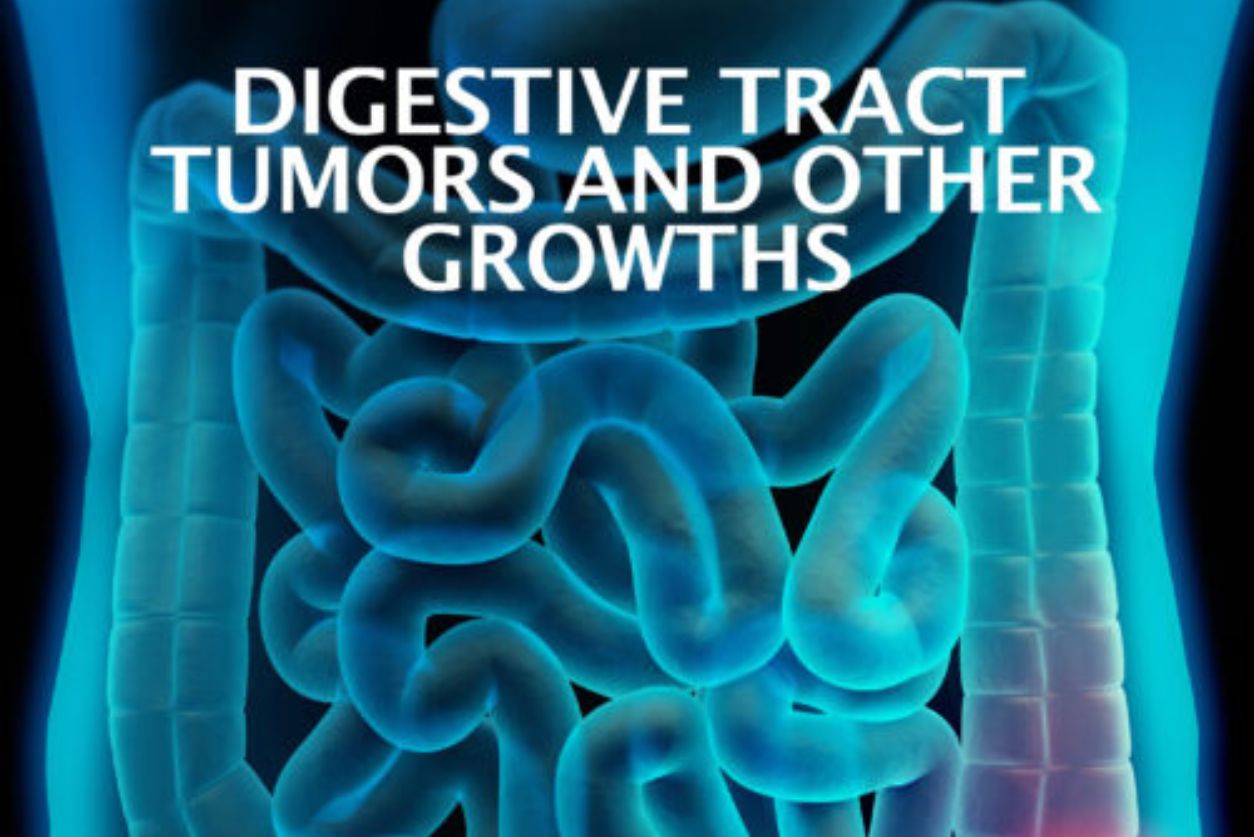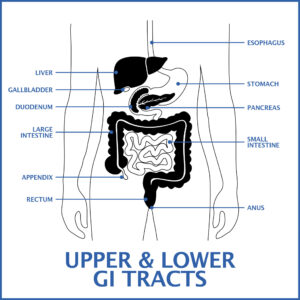
Digestive Tract Tumors and Other Growths
The digestive system plays a crucial role in your body. Abnormalities, such as tumors and other growths, can adversely influence the digestive system’s function.
Digestive Tract Overview
Without your digestive tract, the body could not properly operate.
It breaks down the foods you eat into the nutrients needed to provide energy and other important building block substances for your cells, tissues, and organs. Your digestive network also processes and rids the body of waste.
Any disruption in these processes can leave you malnourished, weak, and susceptible to a host of potentially serious health problems.
Components
The digestive system is large and divided into two major parts – the upper and lower gastrointestinal tracts.
The upper gastrointestinal tract (sometimes called the Upper GI) is made up of the mouth, esophagus, stomach, and the top part of the small intestine (the duodenum). This section of your GI system breaks down food and prepares it for further processing.
The Lower GI is made up of the lower part of the small intestine, the large intestine (the colon), pancreas, gallbladder, liver, rectum, and anus.
The Lower GI absorbs the nutrients contained in the foods you consume, creates juices and other substances needed to complete digestion, process waste products, and produce waste material in the form of stool.
Types Of Tumors
Digestive tract tumors are any abnormal cellular growths that impact any part of the digestive system.
Malignant Tumors: Cancerous tumors inside your GI system. Though these life-threatening growths can develop anywhere along the digestive tract, they most commonly occur in the esophagus, stomach, colon, rectum, liver, and pancreas.
Benign: Non-cancerous growths. Among the most common benign GI tract growths are polyps. They typically grow inside the lining of the stomach or colon. Polyps can grow individually or in groups (in rare genetic conditions).There are many other types of benign tumors, including:
- Fat cell growths called lipomas.
- Muscle cell tumors called leiomyomas.
- Growths coming from peripheral nerves.
- Blood cell tumors are known as hemangiomas.
- Fibrous tissue abnormalities called fibromas.
Another noted benign growth is a gastrointestinal stromal tumor, which is often simply abbreviated as GIST.
Causes
The unusual growth of cells triggers both malignant and benign gastrointestinal tumors. This detrimental process could result from many underlying factors, including:
- Environment.
- Poor dietary habits.
- Cigarette smoking and excessive alcohol consumption.
- Age.
- Stress levels.
The most significant precipitating cause is genetics. Many digestive tract cancers run in families. Persons with a close relative diagnosed with one of these malignancies are more likely to develop such conditions.
Risk Factors
You heighten your chances of developing one of these growths by:
- Consuming diets high in fats, salt, frozen, or processed foods.
- Living or working in an industrial environment with excessive chemical exposure.
- Smoking.
- Drinking.
- High stress levels.
- Advanced age.
Symptoms
In many instances, symptoms do not appear until the growths have become prominent. This will vary depending upon where along the GI tract the tumor lies, how large it is, and if it is cancerous.You might experience symptoms such as:
- Abdominal pain.
- Swallowing difficulties.
- Weight loss.
- Decreased appetite.
- Digestive problems.
- Unusual expectoration or excretion of blood.
- Fatigue.
- General malaise.
As the condition progresses, these symptoms can become pronounced and debilitating.
Complications
If not diagnosed and treated in its earliest possible stages, benign and malignant growths can impede organ function, threaten proper digestion, and cause many potentially serious concerns.
Diagnosis
If your doctor believes you may have a digestive tract growth, they will use internal diagnostic imaging tools to reach a better diagnosis. They include X-rays, CT scans (Computerized Tomography), MRI (Magnetic Resonance Imaging), endoscopies to view the upper digestive tract, small tissue samples (biopsies), ultrasound, and colonoscopies.
Examinations might also include blood tests, which could help physicians either rule out or confirm the presence of tumor-causing issues.
Potential Treatment Options
The specific type of treatment your medical team employs will depend on many important factors such as:
- Your age.
- Your general health.
- Whether the tumor is benign or malignant.
- The growth’s size.
- The anomaly’s specific location.
- How advanced the disease is.
Treatment options might include surgery, radiation, chemotherapy, and immunotherapy.
Outcomes
Your outcome will hinge on many of the preceding factors, besides how well and quickly you respond to the specific course of treatment your doctor administers.
Naturally, your chances for long-term survival are longer when dealing with benign growths. The key to better outcomes rests on early diagnosis. Any type of tumor should be diagnosed in its earliest stage. This makes treatment more favorable and manageable.
Prevention
Tumors precipitated by genetic flaws may be difficult and potentially impossible to prevent. You can reduce your risk by:
- Consuming a healthy diet filled with produce products, lean meats, and whole grains.
- Limiting or eliminating drinking or smoking.
- Obtaining adequate rest.
- Getting enough exercise.
- Staying adequately hydrated.
- Avoiding potentially threatening environments when possible.
Above all, you are firmly urged to get routine medical checkups and consult your doctor should you experience any lingering or moderate to severe digestive issues.
Contacting Us
If you have been diagnosed with a digestive tract tumor or display symptoms of one, please contact us. Our practice began more than 15 years ago and has emerged as one of the leading gastroenterology practices in central Florida. We perform a host of diagnostic procedures using state-of-the-art equipment in a friendly, comfortable, and inviting atmosphere where patient care is always a top priority. Contact us today!
